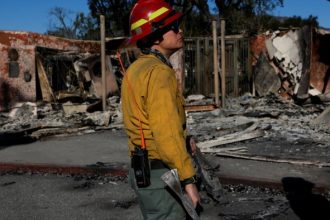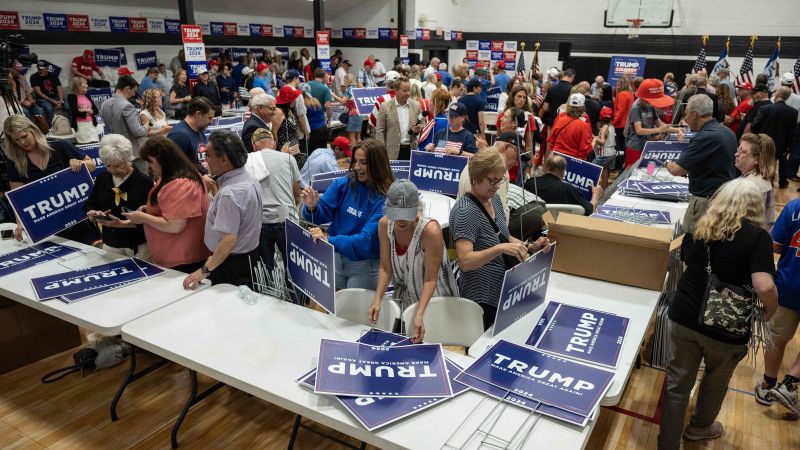Donald Trump is testing the resilience of his evangelical support in Iowa, a key constituency that could solidify – or slow – his march to the Republican presidential nomination.
The former president’s latest comments on abortion, in which he called Florida’s six-week ban a “terrible mistake” and declined to offer a clear view on a federal ban, are being closely scrutinized by his rivals and Christian conservatives, a crucial GOP voting bloc in Iowa.
“For evangelicals, there are probably four issues that matter. Life is usually right at the top,” said Mike Demastus, pastor of the Fort Des Moines Church of Christ. “Most people, the way they evaluate presidential elections, is what the gas price is. But for an evangelical? No.”
Less than four months before the Iowa caucuses open the Republican nominating contest, nuances on abortion policy will be at the center of conversation here among faith leaders like Demastus, who has met with most of the GOP candidates.
He expressed concern over Trump’s remarks on abortion since the Supreme Court decision to overturn Roe v. Wade. But he also acknowledged that Trump’s key role in the decision – appointing three of the six justices who voted with the majority – helps the former president keep evangelical voters in his corner, at least for now.
“The fact that Trump is leading in polls – he is – but you can’t take it for granted. There’s so many unknowns with Trump right now,” Demastus said in an interview. “There’s a loyalty with Trump, and people that follow him. You can’t just peel that away from some, but I think many people in the evangelical community right now are willing to hear from other people.”
Whether Iowa Republicans are willing to hear from – or actually vote for – one of Trump’s many challengers is an open question. The answer could rest inside Iowa churches, where candidates are going to great lengths to win over evangelicals, who in 2016 comprised nearly two-thirds of all GOP caucus attendees.
“They are very appreciative of the former president, but they are exhausted as well,” said Bob Vander Plaats, president of influential Christian group The Family Leader. “Iowa is tailor-made to upend Trump. If he loses Iowa, there’s a competitive nomination process. If he wins Iowa, I think it’s over.”
The Iowa caucuses, in effect, have become a furious race for second place.
While Vander Plaats has been a leading Trump critic, his assessment of the Iowa caucuses is shared by allies of the former president, who plans to step up his Iowa appearances for the rest of the year. Starting with a visit to Dubuque on Wednesday, the Trump campaign is intensifying its focus here in hopes of “squeezing off the oxygen” for other rivals, a Trump adviser told CNN.
The pursuit of evangelical voters is a top priority for most candidates, including Florida Gov. Ron DeSantis, who bowed his head as he stood at the center of a prayer circle during a weekend stop at the Fort Des Moines Church of Christ.
“Our rights are endowed by God,” DeSantis told those assembled in the sanctuary. “They do not come from the government.”
The Florida governor leaned into the abortion debate Monday, seizing on Trump’s comments and offering a warning to voters during an interview with Radio Iowa: “I think all pro-lifers should know that he’s preparing to sell you out.”
South Carolina Sen. Tim Scott reminded voters at a stop in Fort Dodge on Monday that he is opposed to abortion. He also has long been highlighting his faith, often weaving in Bible verses on the campaign trail and in his television ads. Former Vice President Mike Pence frequently talks about his religious awakening and his support for a federal abortion ban after 15 weeks of pregnancy, as a minimum.
Trump was the only major presidential candidate to bypass the annual Faith and Freedom Coalition’s fall banquet this past weekend in Des Moines, but Rebekah Gerling proudly wore a Trump sticker as she walked through the convention center. She said she supports the former president as strongly as she ever has.
“I love everything that he stands for,” Gerling said. “He’s willing to stand up for other people who do love God and believe.”
When Gerling was asked whether she was troubled by the criminal indictments the former president is facing, her friend, Theresa Gibson, also wearing a Trump sticker, jumped in before she could answer, calling the charges “false accusations.”
“They’re just going after him because he’s the front-runner,” Gibson said, “and he’s very highly supported.”
Sally Hofmann, a Republican voter who said faith drives many of her decisions, credits Trump for his appointments to the Supreme Court. But she said she is open to supporting another candidate when she walks into her neighborhood caucus in January.
“I like a lot of what Trump has done in office, but his personality concerns me a little bit,” Hofmann said. “I like what Nikki Haley is doing. I like DeSantis too. I’m in that range.”
She said some of her friends and her daughter are concerned about Trump’s rhetoric and conduct. She said it bothers her too, but she’s willing to look beyond it if necessary.
“Like I told my daughter, if I go to a doctor, and that doctor is such a good doctor to evaluate and treat my issue but doesn’t have the personality that I’m most comfortable with, I’ll still go to that doctor,” Hofmann said. “So that’s the way I look at Trump.”
Inside the Fort Des Moines Church of Christ, where Demastus has preached for more than two decades, he explained how he came around to Trump in the first place. He supported Republican Sen. Ted Cruz of Texas in 2016 and was suspicious of Trump’s intentions before he took office.
“He started to do what he said he would do,” Demastus said. “I said some pretty harsh things about him at the time, but let me be clear: He won me over. He won me over because he was consistent.”
For now, Demastus echoes the sentiment of many other faith leaders, saying he is undecided, waiting and watching as the Republican presidential primary unfolds. He believes the indictments against Trump are politically motivated but worries they could weaken his chances in the general election.
“With all the litigation that’s going on, what’s going to happen? Is he going to receive a felony conviction or not?” Demastus said, ticking through a list of uncertainties hanging over the race. “I think that’s why a lot of these candidates are still in it.”
Read the full article here





